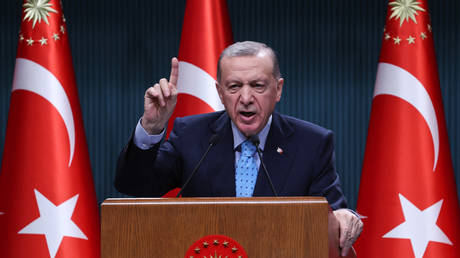ARTICLE AD BOX
The UN’s atomic watchdog has dismissed claims by Israel that Tehran is weeks away from acquiring a nuclear capability
The International Atomic Energy Agency (IAEA) has no evidence that Iran has an active nuclear weapons program, Director General Rafael Grossi has told journalists. The senior official was commenting on remarks by Israel’s UN envoy, Gilad Erdan, who claimed on Sunday that Tehran could obtain a nuclear weapon within weeks.
Grossi said he is not responsible for statements by IAEA member states, but that the agency itself considers the Israeli claim to be unsubstantiated.
“As far as the agency who is inspecting there is concerned, we don’t have any information or indication that there is a nuclear weapon program in Iran,” he told reporters on Tuesday, after briefing members of the UN Security Council (UNSC) in New York.
“The fact that there is an accumulation of uranium enriched at very, very high levels does not automatically mean that you have a nuclear weapon,” Grossi added. He was referring to previous discoveries by IAEA inspectors of traces of highly-enriched uranium in Iran.
Read more Erdogan blames Israel for Iranian attack
Erdogan blames Israel for Iranian attack
Last Sunday, Israeli ambassador Erdan lashed out at Tehran at a UNSC session dedicated to discussing Iran’s drone and missile assault on Israel. Tehran launched the barrage at the weekend in retaliation for an attack on its consulate in Syria on April 1, which it blamed on Israel.
Erdan branded Israel’s regional rival “a terror state responsible for global destruction,” and asked the international security body to consider what would have happened if Iran “could have launched a nuclear bomb” when it attacked his country.
“Iran’s breakout time to produce an arsenal of nuclear weapons is now weeks, mere weeks,” he declared. “The IAEA inspectors have been kept in the dark. Iran is on the verge of becoming a nuclear power. It should terrify every member of this council.”
READ MORE: No Russian heavy weapons at Zaporozhye plant – IAEA boss
Tehran has for decades denied claims that it is seeking a nuclear capability. During the presidency of Barack Obama, the US and other world powers signed a deal with Iran under which it was offered sanctions relief and business opportunities in exchange for accepting restrictions on its nuclear industry. Israel was vocally opposed to the 2015 agreement, known as the JCPOA, and lobbied the administration of Donald Trump, which ultimately withdrew US participation, effectively killing the deal.
.png)
 7 months ago
4
7 months ago
4








 English (US)
English (US)